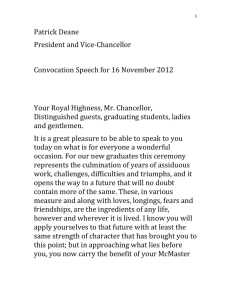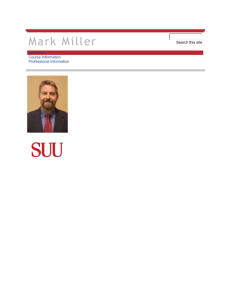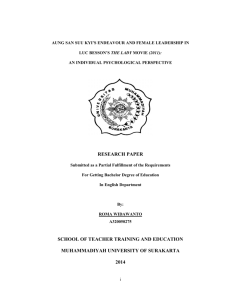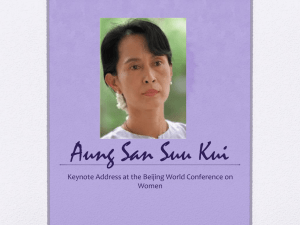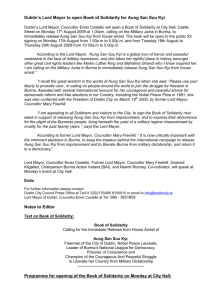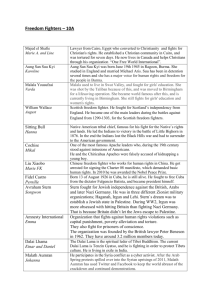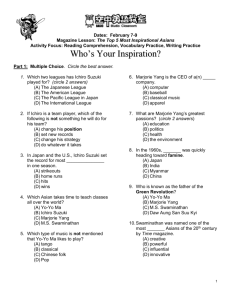Examplar Unit 3 Culminating Aung San Suu Kyi
advertisement
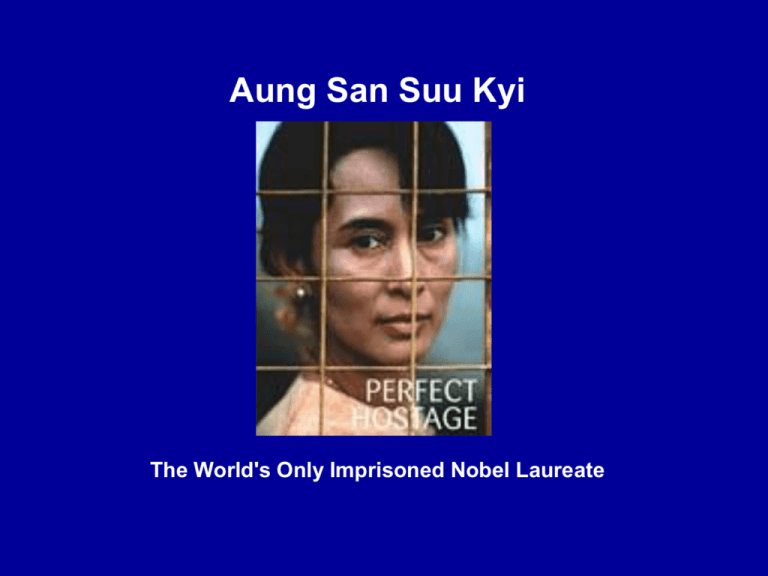
Aung San Suu Kyi The World's Only Imprisoned Nobel Laureate Aung San Suu Kyi • In 1991, Aung San Suu Kyi won the Nobel Peace Prize for peace. • Since 1988, she has been one of leaders “fighting” for democratic and free elections, respect for human rights, free speech and equality in Burma. Burma is ruled by a military dictatorship • She has been under house arrest in Yangon (formerly Rangoon) in Myanmar (Burma)…off and on…since 1988 for 11 of 18 years. • On 27 May 1990, her political party won the election, but the results were rejected by the military dictatorship. She is a “leader in waiting.” • Suu Kyi is an international symbol of heroic and peaceful resistance in the face of oppression. Aung San Suu Kyi What is Revolution? • Revolution is central to the formation of the modern world. • It means transformative change. • As a historical process, revolution refers to a movement, often violent, to overthrow an old regime and effect complete change in the fundamental institutions of society. Aung San Suu Kyi Why do I have to fight??? They killed my father a year ago, And they burnt my hut after that I asked the city men "why me?" they ignored "I don't know, mind your business," the men said. One day from elementary school I came home, Saw my sister was lifeless, lying in blood. I looked around to ask what happened, if somebody'd known, Found no one but living room as a flood. Running away by myself on the village road, Not knowing where to go but heading for my teacher Realizing she's the only one who could help to clear my throat, But this time she gave up, telling me strange things in fear. Why, teacher, why.. why.. why? I have no dad nor a sister left. To teach me and to care for me you said, was that a lie? This time with tearful eyes she, again, said... "Be a grown one, young man, Can't you see we all are dying? And stop this with your might as soon as you can, For we all are suffering." Aung San Suu Kyi Biography • Aung San Suu Kyi was born in 1945. • Suu Kyi is the daughter of General Aung San. In 1947, he led Burma to independence from Great Britain. He was assassinated by political rivals in the same year. • Suu Kyi left Burma as a teenager. Although a Buddhist, she attended Catholic schools. She received formal university training at Oxford in England. • While in England, she married a Tibetan scholar. • She returned to Burma in 1988 to care for her sick mother. She left her husband and two children in England. Daw Aung San Suu Kyi • Burma is a small country located between India, China and Thailand. It has a population of 47.3 million people. The major religion is Buddhism. • Since 1962, Burma was ruled by military dictator General Ne Win until his 2002 death. Since 2002, other military leaders under the name State Law and Order Restoration Council (SLORC) have controlled the country. • In 1989, the name Myanmar was adopted by the military junta in 1989. It has not been formerly recognized by the elected legislature of Burma or parts of the international community. • The military has ruled Burma with an iron fist. Human rights are violated. Daw Aung San Suu Kyi • In 1998, pro-democracy movements were sweeping across Burma, and the All Burma Students Democratic League organized a general strike. • On 8 August 1988, millions of people began a peaceful protest march. General Ne Win ordered the army to attack, and using bullets and bayonets, they killed hundreds of protestors. This day is called The Massacre of 8.8.88 in Burma. • A second rally called for national disobedience was organized for 18 September 1988. Once again, the army attacked. This time the death toll was thousands. • The army claimed they were only killing communists. • The army collected and burned the bodies. Aung San Suu Kyi • In the aftermath of 8.8.88, Suu Kyi became politically active. Heavily influenced by Gandhi's philosophy of non-violence, she began working for democratization of Burma. • SLORC declares martial law and arrests thousands of people, including advocates of democracy and human rights. During this time, SLORC renames Burma Myanmar and the capital Rangoon becomes Yangon. • Suu Kyi was placed under house arrest. She was offered freedom if she would withdraw from politics and leave the country, but she refused. She was held in solidarity confinement for six years. Aung San Suu Kyi • While under house arrest, she becomes leader of the National League for Democracy (NLD). In 1990, NLD wins the election, and Suu Kyi is elected President. The military rulers refuse to accept the people’s will. • In 1991, Suu Kyi is awarded the Nobel Peace Prize for her efforts to bring rights, freedoms and democracy to Burma. It is said Suu Kyi is an outstanding example of the “power of the powerless.” Suu Kyi is not allowed to travel to accept the award. • In 1995, she is freed from house arrest, but her movements are strictly controlled. Aung San Suu Kyi • In 1995, Suu Kyi “attends” a Women’s Conference in Beijing by secret videotape. • In her speech, she says, “To the best of my knowledge, no war was ever started by women, but it is women and children who have always suffered the most in situations of conflict. There is an outmoded Burmese proverb still recited by men, who wish to deny that women too can play a part in bringing necessary change and progress to their society: The dawn rises only when the rooster crows. Burmese people today are well aware of the scientific reason behind the rising of dawn and the falling of dusk, and the intelligent rooster surely realizes that it is because dawn comes that it crows and not the other way around. It crows to welcome the light that has come to relieve the darkness of night. It is not the prerogative of men alone to bring light to the world. Women with their capacity for compassion and selfsacrifice, their courage and perseverance, have done much to dissipate the darkness of intolerance and hate, suffering and despair.“ • In 1999, her husband dies of cancer in England. Fearing she will not be allowed back into Burma if she leaves, Suu Kyi does not see him before he dies. Instead, she gives saffron robes to 53 monks. Aung San Suu Kyi • In 2000, Suu Kyi is arrested for violating travel restrictions within Burma and returned to house arrest. • After UN-led negotiations to build “trust” in 2002, she is released, but in 2003, a mob attacks and kills many of Suu Kyi’s supporters. “For her own protection”, Suu Kyi is jailed in Insein Prison in Yangon. Later, she is transferred to house arrest. • During this time, Suu Kyi dedicates the rest of her life to represent the average Burmese citizen. • During her arrest, Suu Kyi has been visited by many international leaders who call for her release. Using the 1975 State Protection Act (Article 10 b) which grants the government the power to imprison persons for up to five years without a trial, the military rulers ignore the world’s demands. Aung San Suu Kyi • In November 2007, Suu Kyi meets with NLD members for the first time in many years. • In October 2007, Buddhist monks begin non-violent protests called the Saffron Revolution over government economic actions. The military junta suppressed this action with brutal force. • Suu Kyi has not seen her two sons since 1988. She remains a prisoner in her own home. Suu Kyi is 65 years old. She may be Burma’s last hope for democracy. Aung San Suu Kyi Her Contributions Leadership Heroism Fortitude Peace Hope Spirit Dedication Strength Meaning Freedom Resolve Truth

